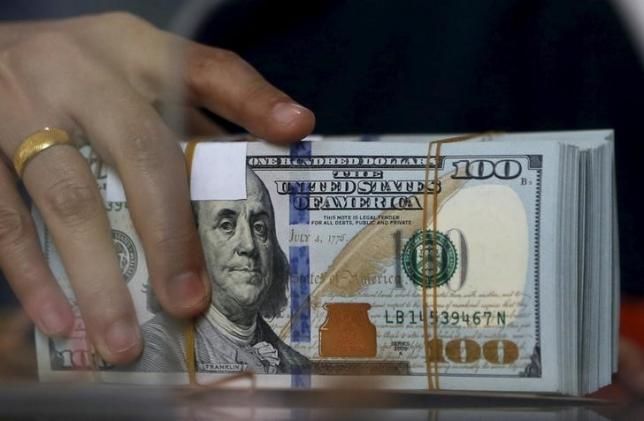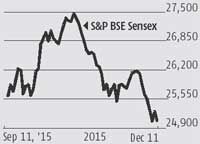Events like a US Fed rate increase should not worry retail investors too much, but any fall in the market is always an opportunity to enter good stocks.
 The fear of the US Federal Reserve's rate hike has already taken its toll on the Indian stock market.
The fear of the US Federal Reserve's rate hike has already taken its toll on the Indian stock market.
Of the past eight trading sessions, seven have ended in the red.
The BSE Stock Exchange Sensitive Index, or Sensex, is down a little over two per cent since November. And, if the Fed were to indeed increase the rate, there is fear of more outflows.
Lessons from the past
Investment advisors believe the market, as usual, is overreacting to an impending event.
"In the 2004-2006 rate hike cycle by the Fed, the markets did quite badly before the first hike took place in June 2004. But, after that, things changed," says an investment advisor.
In the past 20 years, Indian markets have reacted in a mixed manner to rate increases by the US Fed. In the three months preceding a rate rise in February 1994, the Sensex was up 49 per cent but fell by eight per cent in the next three months.
However, foreign institutional investors (FIIs) did not have a big role at the time in Indian markets.
The next rate cut in June 1999 also did not see much reaction. The Sensex was up 12 per cent in the three months before the rise and continued its northward journey, rising 15 per cent in the next three months.
In 2004, the market fell sharply by 13 per cent, three months before the rate rise.
By this time, FIIs had started having a bigger say in the Sensex's fortunes. In the next three months, it had wiped off all the losses and was up 16 per cent.
 Arun Kejriwal, investment advisor, feels whether one is a trader or investor, the current scenario is confusing.
Arun Kejriwal, investment advisor, feels whether one is a trader or investor, the current scenario is confusing.
The Fed's impending decision isn't the only reason. "It is not just a global event but absence of any movement on crucial bills like GST (the proposed national goods and services tax) is worrisome."
"It is a one step forward, two steps backward scenario," he says. And, it could be a time when global bottoming-out of markets takes place.
It could be a tough week In the run-up to such an event, the market is always nervous.
For savvy investors, a good time to pick up stock or even start a mutual fund investment, as the net asset values fall sharply.
 It could be a tough week In ideal circumstances, retail investors should not be worrying too much about short-term stock market movements. However, there are often opportunities to buy or sell when there is fear in the market. To quote investment guru Warren Buffett: "Be fearful when others are greedy and be greedy when others are fearful."
It could be a tough week In ideal circumstances, retail investors should not be worrying too much about short-term stock market movements. However, there are often opportunities to buy or sell when there is fear in the market. To quote investment guru Warren Buffett: "Be fearful when others are greedy and be greedy when others are fearful."
This seems a good time to follow his philosophy. A lot of good stocks are available at cheap prices.
For example, Sun Pharma's stock is down almost Rs 100, from Rs 856 to Rs 756 in the past three months. In fact, the Nifty pharma index is down 7.6 per cent in this period.
In the past month, Dr Reddys' Labs, State Bank of India, Axis Bank and Infosys are among the stocks down five to 11 per cent, allowing a good entry point to direct investors.
Andrew Holland, chief executive, investment advisory, Ambit Investment Advisors, believes retail investors should continue systematic investment plans. As for himself, he prefers to sit on cash.
Kejriwal believes it could be a good time to buy good stocks, mostly large-caps and not mid-caps or small-caps.
"A little buying can always take place but there is more safety in large-caps in such situations. If one has cash, one can use as much as 25 per cent to buy large-cap stocks," adds Kejriwal.
Other experts say apart from quality of a stock, timing is important.
Says one: "If you are buying for a year or more, there will be enough stocks available that will give good returns."
Similarly, for mutual fund investors, there would be good schemes which have been hit in this correction.
Even the large-cap category average has fallen 1.5 per cent in the past three months.
However, they've contained their losses much better than the indices, as both the Sensex and Nifty are down a little over two per cent in this period. Over the past year, some of the best large-cap schemes' net asset values are down by five to 15 per cent.
And, these are schemes which have given 15 per cent annualised returns over 10-20 years.











